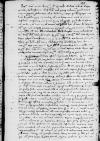Post ⌊⌋ vel potius volumen, quod anno praeterito XXIIII Februarii ad te dederam, accepi quidem copiosas a te ⌊⌋ ⌊Bruxellis⌋ XIII Septembris ad me datas, verum ⌊⌋ in paucis respondentes, causabaris enim te eas ⌊Brugis⌋ reliquisse. Quod idem ad praesens mihi accidit, cum ⌊⌋ etiam ad manum non habeam. Hanc ob rem de negotiis inter nos scribi inceptis parum me occupabo, ad quae hic tractanda cum duce ms. ducae(!)
⌈duceduce ms. ducae(!)
⌉ in ⌊Prussia⌋
ill(ustrissimo) or ill(ustri)⌈ill(ustrissimo)ill(ustrissimo) or ill(ustri)⌉
domino ⌊Alberto marchione Brandenburgensi⌋ tu me induxeras. Hoc tamen obiter addendum censui, quod, cum nuper a ⌊serenissimo domino meo⌋ ad ⌊comitia Regni⌋ ⌊Cracoviam⌋ vocatus essem, venit eo et illustrissimus dominus ⌊Otto Henricus⌋ comes palatinus ⌊Rheni⌋, qui humanissime exceptus et habitus pro votis etiam absolutus hanc oblationem a ⌊serenissimo rege meo⌋ accepit, quod si illustrissimus ⌊comes palatinus Fredericus⌋ vellet, ut serenissimus rex meus ratione dotis inter eum et ducem ⌊Holsaciae⌋ ⌊electum Daniae regem⌋ amicis modis tractaret, idipsum ⌊serenissimum dominum meum⌋ pro ea propensione, qua inclute domui comitum palatinorum afficitur, non gravate suscepturum. Quod dux ⌊Otto Henricus⌋ ad deferendum ⌊fratri suo Frederico⌋[1] recepit. Sed de iis hactenus.
Memini, quod scripseras in ⌊⌋ tuis te fortassis me numquam amplius in hac vita visurum. Ego tamen in eo non despero,
cf. Pl. Mos. 197 insperata accidunt magi’ saepe quam quae speres ⌊insperata enim, ut ⌊ille⌋ ait, saepius, quam quae speramus, eveniuntcf. Pl. Mos. 197 insperata accidunt magi’ saepe quam quae speres ⌋. Quod si concilium successisset, te et me inibi futurum forsan per occasionem se obtulisset. Posset et alias hoc fieri neque diffido, quin, antequam ex hac vita decedamus, nos mutuo visuri si written over u⌈uii written over u⌉mus. Solent se offerre multae causae, quibus de oratores hinc inde mitti solent: offerunt se tractandae concordiae, matrimonia et id genus non pauca, interdum et
graviora, immo et leviora. Quid, si ego aliquando animi causa vos convenirem? Quicquid tamen eveniat, si te non iis, quibus scribo,
cf. Cic. Orat. 101 nullis nisi mentis oculis videre ⌊animi tamen oculis te mihi praesentem videocf. Cic. Orat. 101 nullis nisi mentis oculis videre ⌋ crebrius, quam tu fortassis opinaris. Itaque tibi de me, mi carissime frater Corneli, persuade,
cf. Cic. Orat. 101 nullis nisi mentis oculis videre ⌊sive te oculis, sive mente viderocf. Cic. Orat. 101 nullis nisi mentis oculis videre ⌋, eundem me tibi esse, qui fui semper, amicum, neque ulla negotia nationum vel principum, vel causae quantumvis arduae passionesve aut affectus eo me sunt perducturi, ut in amicitia tecum a tot annis multa iocundissima consuetudine mutuoque amore firmata vacillare vel velim, vel possim. Tenacior sum, quam ut id, quod semel, maxime autem per mutuam benevolentiam, animo meo impressi, remittere valeam. Quod quidem et de te superinscribed⌈tete superinscribed⌉ mihi candorem integritatemque tuam cognitam habens certo, inquam, mihi polliceor. Non sint igitur tanti
cf. Hor. Epod. 1. 2. 6-8 fabula qua Paridis propter narratur amorem / Graecia barbariae lento conlisa duello, / stultorum regum et populorum continet aestus ⌊stultorum regum et populorumcf. Hor. Epod. 1. 2. 6-8 fabula qua Paridis propter narratur amorem / Graecia barbariae lento conlisa duello, / stultorum regum et populorum continet aestus ⌋
contentiones, ut cf. Cic. Off. 1.(9)28 de quibus inter se digladiari soleant ⌊inter nos de iis digladiari debeamuscf. Cic. Off. 1.(9)28 de quibus inter se digladiari soleant ⌋. Quin potius, quantum per nos fieri potest, ad hoc spectemus, ut istiusmodi diffidentes amicitia nostra salva manente ad concordiam, quae publicae tranquillitatis mater est, revocare possimus etc.
Quod reliquum est, cum te de rebus meis sciam esse soll stain⌈[ll]ll stain⌉icitum omniaque mihi fausta favere, latere te nolui, quod, Deo gratia, iis, qui mihi sine causa hostes fuerant, superatis coadiutor reverendissimi domini ⌊episcopi
 BCz, 244, p. 200
Varmiensis⌋, qui in quadruplo pinguiorem meo habet episcopatum, factus sum. ⌊Pater⌋ est et bonus, et pius aetateque et valetudine continua confectus. Quem de nobis duobus Deus prius vocare voluerit, in divina eius est potestate. Ille te cum honestissima ⌊tua coniuge⌋ ⌊filio⌋que atque tuis omnibus, ms 2 3 4 quos,
BCz, 244, p. 200
Varmiensis⌋, qui in quadruplo pinguiorem meo habet episcopatum, factus sum. ⌊Pater⌋ est et bonus, et pius aetateque et valetudine continua confectus. Quem de nobis duobus Deus prius vocare voluerit, in divina eius est potestate. Ille te cum honestissima ⌊tua coniuge⌋ ⌊filio⌋que atque tuis omnibus, ms 2 3 4 quos,
ms 1 quo[s] paper damaged⌈quosms 2 3 4 quos,
ms 1 quo[s] paper damaged⌉ omnes salvere iubeo, quam diutissime sospitem et felicem conservet.
 BCz, 244, p. 200
Varmiensis
BCz, 244, p. 200
Varmiensis
